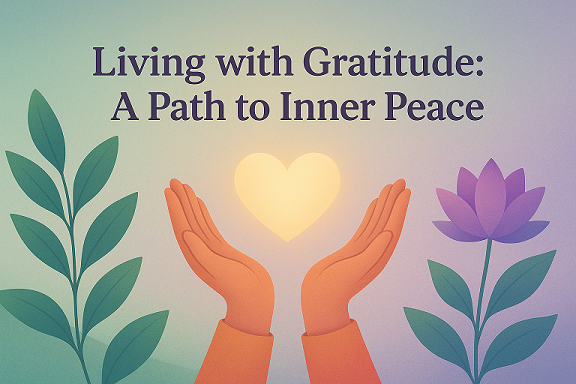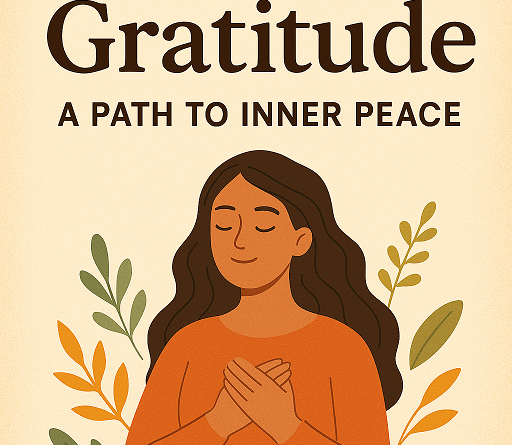Living with Gratitude: A Path to Inner Peace

Introduction
Life in Pakistan, or anywhere in the world, is full of challenges—financial pressures, social responsibilities, and uncertainties about the future. Yet, amidst this chaos, I have found that gratitude is one of the most powerful tools for regaining and Living with Inner peace. Gratitude is not about ignoring problems; it is about choosing to focus on the blessings we already have. Even small acknowledgments—like being thankful for family, a roof over one’s head, or the ability to breathe in fresh air—can shift our perspective and lighten the heart.
1. Why Gratitude Matters
Modern science backs up what many of us already feel in our hearts. Research shows that gratitude reduces anxiety and depression, improves sleep, and strengthens relationships (UCLA Health). Personally, I have noticed that when I make a habit of saying Alhamdulillah (Thanks be to God) for even the smallest things, my stress levels drop. Suddenly, my problems seem manageable because I am reminded of what I do have, instead of obsessing over what I lack.
2. Gratitude as a Mental Reset
There are days when life feels overwhelming—work deadlines, inflation, or family responsibilities. On such days, writing down three things I am grateful for serves as a mental reset. Research calls this a gratitude journal, and studies confirm it can boost optimism and well-being (Positive Psychology).
For me, gratitude journaling is like having a private conversation with myself. Even noting something simple like “I am grateful for the cup of tea I enjoyed this morning” helps me realize life’s beauty lies in small moments.
3. Gratitude and Faith
In Pakistan, gratitude is deeply tied with religion and culture. Islam encourages us to give thanks in all circumstances. The Qur’an even promises:
“If you are grateful, I will surely increase you in favor” (Quran 14:7).
I find this teaching both comforting and practical. When I consciously thank Allah for the blessings I already have—my family, health, or even challenges that made me stronger—I experience a sense of calm. This aligns with local research too: studies from Punjab University show that gratitude, both general and religious, correlates strongly with life satisfaction (PPRI).
4. Avoiding the “Gratitude Trap”
Of course, gratitude should never mean forcing ourselves to smile through pain or ignoring problems. Psychologists warn against the “gratitude trap”, where people use fake positivity to suppress real emotions (Wall Street Journal).
I have personally felt this too—sometimes, when life gets heavy, it feels impossible to be thankful. In those moments, I remind myself it’s okay to feel sadness, frustration, or anger. Gratitude is not about denying pain—it’s about holding on to hope while acknowledging reality.
5. Simple Practices That Work
Here are practices that have helped me Living with Inner Peace, and which are also supported by science:
- Gratitude Journal – Writing 3–5 things weekly. Studies show this increases happiness and reduces stress (PMC).
- Gratitude Letters – Sending a message of thanks to a friend or teacher has not only made them happy but also deepened my relationships (Forbes).
- Mindful Moments – Sometimes I pause during sunset or while having a meal, reminding myself to “savor this moment.” This habit of mindfulness and gratitude helps anchor me in peace (Time).
- Daily Alhamdulillah – Simply saying it with sincerity after small blessings—like safe travel or a good meal—builds a mindset of constant appreciation.

Conclusion
Living with gratitude is not about pretending life is perfect. It’s about embracing imperfection with a thankful heart. For me, gratitude has become like a gentle lamp in the dark—it doesn’t remove the darkness completely, but it gives just enough light to keep walking forward with peace.
The science confirms what our faith and culture already teach us: gratitude transforms the mind and nourishes the soul. When practiced with sincerity, it becomes not just a habit, but a way of life—a path to true inner peace.
I must say, while going before sleep, I remember how my whole day was passed and how I deal with people, that gave me peace of mind that I have not hurt someone’s heart and try to make people happy by performing my duties, on the other hand if someone’s feel bad or mistakenly hurt, I keep in mind that we must apologize by tomorrow morning, as saying sorry will give you peace too. try to implement in your practical life, you will be amazed with the story Living with Inner Peace

